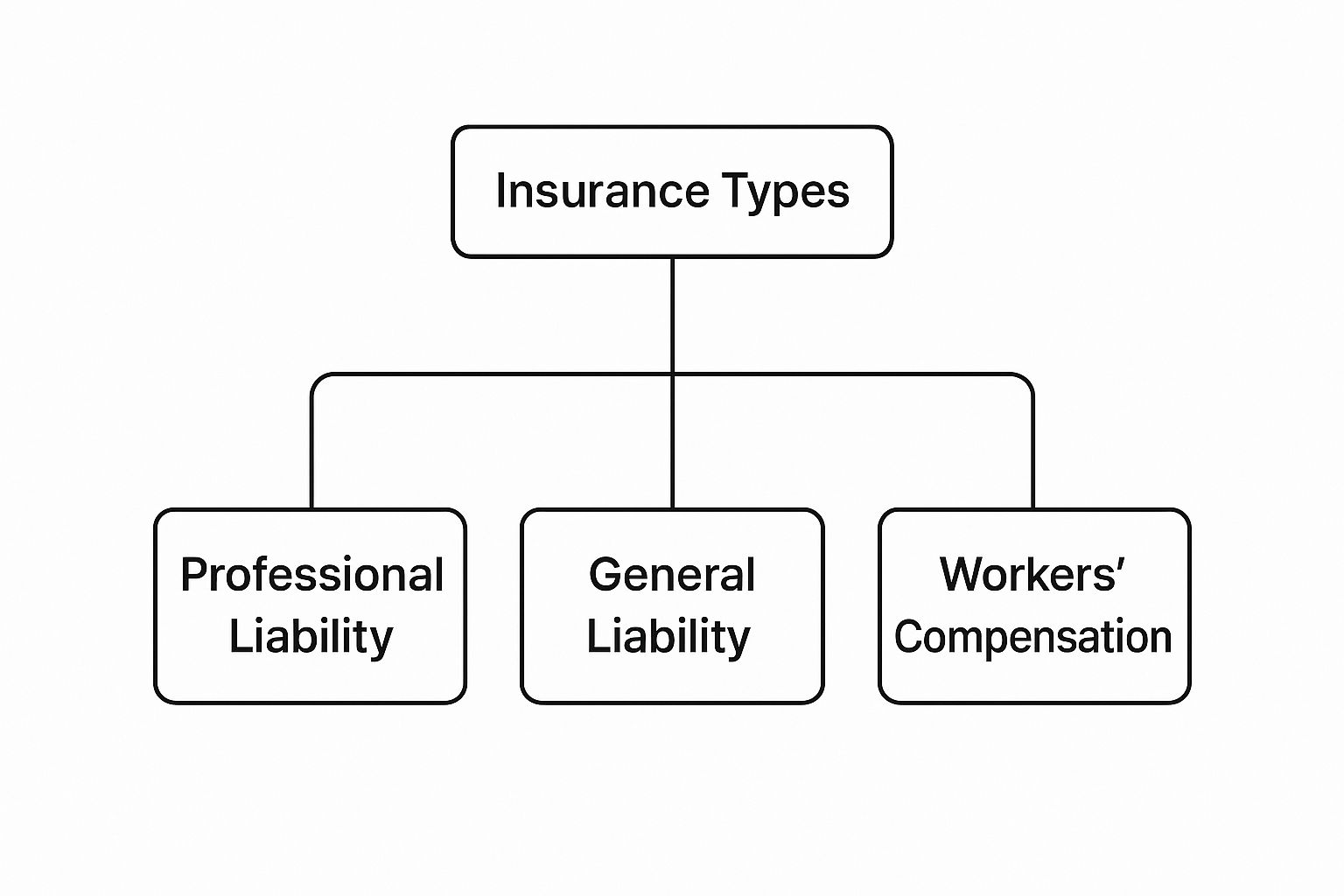Insurance for Recruitment Agency | Protect Your Business
- Janis Kolomenskis
- Aug 1
- 13 min read
Welcome to the high-stakes, high-reward world of recruitment! You're not just a matchmaker; you're a career architect and a company builder. In this fast-paced industry, the right insurance for recruitment agency isn't just a line item on your budget—it's the bedrock that lets you operate with confidence, protect your hard-earned reputation, and secure your future.
Why Your Agency Needs a Specialized Insurance Shield

Think of your recruitment agency like a high-performance race car. You wouldn't fill that finely tuned engine with regular unleaded and expect to win the championship, would you? Of course not. You'd use specialized racing fuel and have a dedicated pit crew on standby.
In the same way, a generic, off-the-shelf business policy is like that regular gasoline. It just doesn't have what it takes to protect your agency from the very specific risks you face every single day.
Your agency operates in a world of huge expectations and even bigger liability. Every single placement is a promise. A broken one—even if it was a complete accident—can trigger disastrous financial and reputational fallout.
This is where tailored insurance comes in. It’s your high-octane fuel and protective roll cage, designed specifically for the twists and turns of the recruitment world. It's built to address the unique vulnerabilities most other businesses never even have to think about.
Unique Risks in the Recruitment Industry
The risks you navigate are anything but ordinary. A simple mistake can snowball into a crippling lawsuit, threatening everything you've worked so hard to build.
Here are a few of the big ones:
Costly Placement Errors: Imagine placing a candidate whose skills were exaggerated or whose credentials weren't quite what they seemed. If they cause problems, your client could sue you for the damages.
Data Breach Dangers: You're a gatekeeper for a treasure trove of sensitive personal information, from resumes to private contact details. This makes your agency a very attractive target for cybercriminals.
Contractual Liability: Pay close attention to your client agreements. They often contain indemnity clauses that shift a massive amount of risk directly onto your shoulders.
This pressure is cranked up even higher in certain specialized fields. Take the insurance industry, for example. It's grappling with a massive talent crisis, with an estimated 21,500 annual job vacancies expected over the next decade. For recruiters in that space, the pressure to fill roles is immense, and a bad placement can have wildly amplified consequences. You can read more about the insurance talent gap challenges on InsuranceJournal.com.
Don't worry, we're about to break down exactly what coverage you need. Let's turn insurance from a confusing chore into your agency's secret weapon.
The Three Essential Policies Every Recruiter Needs
Alright, now that we're on the same page about why off-the-shelf insurance just won't cut it, let's get into the specifics. Think of these next three policies as the bedrock of your agency's financial security. They're the non-negotiables, the absolute must-haves that create a safety net for your business.
This diagram breaks down the fundamental insurance types every recruitment agency owner should have on their radar.

The real takeaway here is that each policy is designed to tackle a completely different kind of risk. This is exactly why a single, generic plan is never enough to truly protect you. Let's dig into what each one covers with some real-world scenarios you might actually encounter.
Professional Indemnity Insurance
Honestly, this is your career-saving coverage. Professional Indemnity (PI) insurance is what shields you from claims of negligence, mistakes, or bad advice related to your professional services. It's your first line of defense if a client alleges your work cost them money.
Let’s play out a scenario. You place a senior software developer in a crucial role at a fast-growing tech company. You did your due diligence, but somehow missed that the candidate fudged some of their credentials. A couple of months down the line, their lack of skill leads to a major system crash, costing the client a fortune in downtime and lost business. You can bet they'll be coming after your agency to foot the bill.
This is precisely where PI insurance swoops in to cover the legal defense fees and any potential settlement, preventing a single mistake from cratering your entire agency. While insurance is crucial, solid vetting is your best prevention. You can always strengthen your screening by exploring some of the top free resume search tools for recruiters.
Public Liability Insurance
This one’s all about protecting you from the unexpected physical mishaps that can happen when you interact with the public. Public Liability insurance has your back if someone gets injured or their property is damaged as a result of your business operations.
Picture this: a fantastic candidate comes to your office for an interview prep session. They’re excited, you’re excited. But as they walk into the meeting room, they trip over a stray power cord, breaking their wrist and shattering their brand-new tablet. A simple accident just became a huge headache. Public Liability would step in to handle their medical bills and the cost of replacing their device, stopping a minor incident from escalating into a costly lawsuit.
Without Public Liability, a simple slip-and-fall could spiral into tens of thousands in legal and medical bills. It’s a foundational policy for any business that has a physical office or meets with people face-to-face.
Employers' Liability Insurance
If you have anyone working for you—even just one person—this policy is almost always a legal requirement. Employers’ Liability (EL) insurance protects you if one of your own employees gets sick or is injured because of the work they do for you.
For example, let's say your top recruiter, who is an absolute machine on the phone and at their desk all day, develops a serious case of repetitive strain injury (RSI). They claim it’s a direct result of the poor ergonomic setup of their workstation and a relentless workload that you, as the employer, failed to manage properly. EL insurance is what would cover the costs of defending against that claim and any compensation awarded to them. It’s all about protecting your team, and in turn, protecting your business.
Understanding Professional Indemnity Insurance

If your agency's insurance portfolio has a star player, this is it. Professional Indemnity (PI) insurance is the absolute bedrock of protection for any recruitment agency. Think of it as your agency’s reputation parachute. It gives you the confidence to take smart operational risks—like placing a C-suite executive—without the constant fear of a catastrophic freefall if things don’t pan out.
This is the policy that kicks in when a client accuses your professional services of causing them a financial hit. It’s not just about blatant mistakes; PI insurance shields you from a whole host of potential slip-ups that can happen even when you have the tightest processes. It's the financial safety net that protects both your brand and your bank account when a placement goes sideways.
What Does PI Insurance Actually Cover?
While other policies handle physical mishaps, PI insurance is all about the financial consequences of your professional advice and actions. This coverage is built specifically for the unique scenarios you face as a recruiter every single day.
Here are a few classic examples of what PI insurance is for:
Negligent Placements: You place a candidate who doesn’t actually have the qualifications they listed on their CV. Their incompetence causes your client’s project to tank, and now they’re suing you for the damages.
Breach of Confidentiality: One of your team members accidentally forwards an email loaded with sensitive client plans or candidate data to the wrong person.
Loss of Documents: A top candidate’s original certificates and portfolio are lost or stolen while in your possession, racking up replacement costs and sparking a legal threat.
Intellectual Property Infringement: You unknowingly pass along a resume that contains plagiarized content from someone else's work, which lands your client—and then you—in hot water over an IP claim.
The stakes are only getting higher, especially in specialized sectors. For example, in the insurance and actuarial fields, a major talent crunch means a staggering 60-70% of new recruitment roles are for expansion, not just backfilling positions. That puts enormous pressure on agencies to source top-tier talent, which naturally increases the risk of a bad hire. When you're playing in a market that intense, PI insurance isn't just nice to have; it's critical.
A single allegation of professional error—even a baseless one—can force you to shell out thousands just on legal defense. Without PI coverage, the cost of simply proving your innocence could be enough to shut you down for good.
This is precisely why having a solid policy is completely non-negotiable. It’s what separates a business-ending lawsuit from a manageable, insured event. Grasping what's at risk also highlights why tracking your agency's performance is so important. On that note, you might find our guide on the essential recruiting metrics to improve hiring in 2025 really helpful.
Let's pop the hood and look at what really drives the cost of your agency's insurance.
Ever wonder why your car insurance quote is what it is? The insurance company looks at the car you drive, your personal driving record, and even where you park it at night. Getting insurance for a recruitment agency follows that same logic. It’s all about a collection of specific risk factors that add up to your final premium.
Think of it this way: insuring an agency that places temporary construction workers is a bit like insuring a high-performance sports car. The potential for something to go wrong—like a workplace injury or property damage—is just naturally higher. On the flip side, an agency that only places permanent office administrators is more like insuring a reliable family sedan. The built-in risks are lower, and the premium will reflect that.
It All Comes Down to Your Agency's Unique Risk Profile
Insurers aren't just guessing or pulling numbers out of a hat. They’re digging into the specifics of your agency to figure out a fair price. It really boils down to how much risk they’re taking on by giving you a policy.
Here are the big-ticket items that will move the needle on your insurance costs:
Your Annual Turnover: This is a big one. Higher revenue usually means you’re handling more placements and bigger contracts, which naturally increases your exposure to potential claims.
The Types of Roles You Fill: The industries you serve make a huge difference. Placing healthcare professionals, like travel nurses, comes with a completely different set of liabilities compared to placing IT consultants. The recent shutdown of major nurse staffing divisions like RNnetwork really shines a light on the volatility and specific risks in certain high-stakes fields.
The Size of Your Team: More internal employees, from recruiters to admin staff, means a greater need for Employers' Liability coverage and a higher chance of a simple human error causing a problem.
Your Claims History: This is your report card. Just like a no-claims discount on your car insurance, a squeaky-clean record without any previous claims can seriously lower your premiums over time.
A pristine claims history is your single best negotiation tool. It proves to insurers that you run a tight ship with solid processes, making you a low-risk partner they want to work with—often at a much better rate.
How to Take the Wheel on Your Premiums
Here’s the great news: you aren't just a passenger on this ride. You've got your hands on the steering wheel and can absolutely influence what you end up paying.
It all starts with building rock-solid internal processes. Think rigorous candidate vetting to catch red flags, iron-clad client contracts that clearly spell out who is responsible for what, and just a general commitment to keeping that claims record clean.
When you proactively manage these areas, you're sending a powerful signal to insurers that you're a responsible business. That often translates directly into better pricing when it's time to renew your policy. Having a detailed chat with a specialist broker can uncover even more strategies to get the right coverage without breaking the bank.
Choosing the Right Insurance Partner for Your Agency

When it comes to getting insurance for a recruitment agency, it's so tempting to just hunt for the lowest price tag. But honestly, that’s a rookie mistake. Think of this process less like buying a utility and more like hiring a key business partner. You need someone who truly gets the ins and outs of the recruitment world—from the tricky vicarious liability issues with temp placements to the fine print in your client contracts.
A general insurance broker might be perfect for the coffee shop down the street, but they often don't have a clue about the specific minefield you navigate every day. A specialist, on the other hand, is already deep in the trenches. They won’t just hand you a generic policy; they'll become a trusted advisor, helping you build a genuine safety net that’s built for your agency.
Why a Specialist Broker Is a Game-Changer
Working with a specialist is probably the single best decision you can make here. They bring a level of industry-specific insight that a generalist just can’t touch. A true specialist understands that the risk profile for placing a permanent CEO is worlds apart from placing a team of temporary IT contractors. That kind of nuance is everything.
Just look at the insurance labor market itself to see how specialized this world is! Overall employment is expected to tick up by 1.08% in the next year. But dig deeper, and you'll see Commercial Property & Casualty roles are set to jump by 2.41%, while personal lines might actually dip. A specialist understands these market forces and how they impact your agency’s exposure. You can dive into the numbers yourself by checking out the full labor market study from Jacobson and Aon.
Choosing a broker is like choosing a co-pilot for your business. A generalist might know how to fly a plane, but a specialist has already flown your exact route through a storm and knows where the turbulence is.
Key Questions to Ask Potential Brokers
To find that perfect-fit partner, you need to show up prepared. Don't be timid! This is your opportunity to interview them with the same rigor you apply to your top candidates.
Here’s a great starting checklist of questions to bring with you:
Experience: "How many other recruitment agencies are you currently working with?"
Specialization: "Can you walk me through the specific risks you see in placing temporary vs. permanent staff in our main industry?"
Claims Process: "What happens when we need to make a claim? Are we talking to you directly, or are we routed to a massive call center?"
Risk Management: "Beyond just selling us insurance, what proactive advice can you give us to help lower our premiums over the long run?"
Getting this choice right is a cornerstone of your business strategy. For more tips on building an amazing agency from the ground up, have a look at our guide on the top recruiting best practices to attract talent in 2025. Putting in the effort now to find a real partner will pay off massively, giving you the peace of mind that your agency is truly protected.
Your Action Plan for Agency Protection
Alright, we've waded through the world of recruitment agency insurance. Now it’s time to put all that knowledge to work and build your fortress. Getting the right coverage isn't just a boring defensive task; it’s one of the smartest, most growth-focused moves you can make for your agency. This is what makes your business resilient, not fragile.
And let's be clear: this isn't just about dodging bullets. The right insurance sends a powerful message to your clients. It screams professionalism and stability, giving you the confidence to chase bigger contracts and place high-stakes roles without looking over your shoulder. Think of it as your secret weapon for scaling up.
Insurance for a recruitment agency isn't just an expense—it's an investment in stability, reputation, and fearless growth. Your goal isn't just to survive risks but to build a business that thrives because it's prepared for them.
Your Immediate Protection Checklist
Feeling fired up? Perfect. Let's channel that energy into action. Use this straightforward checklist to review what you've got or to guide your very first policy purchase. This is your launchpad.
Audit Your Risks: Seriously, what kind of roles are you filling? Dig into your client contracts and find those sneaky indemnity clauses that push all the liability onto your plate.
Confirm Your Essentials: Do you have the "Big Three" covered? That's Professional Indemnity, Public Liability, and (if you have a team) Employers’ Liability. No excuses.
Find a Specialist: Don't just go with any old broker. You need someone who speaks the language of recruitment—someone who gets the unique tightrope you walk every single day.
Document Everything: Your best defense is a great offense. A rock-solid paper trail of your vetting, onboarding, and communication processes is your number one tool for negotiating better premiums.
Taking these steps shows you're not just serious about placing talent, but also about protecting the incredible team that makes it all happen. Creating that secure foundation is everything, and you can dive deeper into that with our guide on top employee retention strategies to keep top talent.
Now, go build with confidence.
Your Top Insurance Questions, Answered
Let's be honest, insurance can feel like a maze of jargon and what-ifs. But getting your head around it is one of the smartest things you can do for your recruitment business. To help you out, I’ve put together some plain-English answers to the questions I hear most often from agency owners just like you.
Do I Really Need Professional Indemnity Insurance for My Temps?
You bet you do! I'd argue it’s even more crucial when you're placing temporary staff. When you place a temp, your agency is on the hook for their professional mistakes or negligence while they're on assignment with your client.
Think about it this way: you place a freelance developer who accidentally wipes a critical client database. Who do you think the client is coming after? Not the temp—they're coming after you. Your agency is the one with the contract, and they'll hold you responsible for the massive financial fallout. This is exactly what Professional Indemnity insurance is for. It’s your financial shield, covering legal fees and compensation costs that could otherwise sink your business.
What’s the Difference Between Public and Employers Liability?
This is a classic point of confusion, but it's actually pretty simple when you break it down. They protect you from completely different risks involving different groups of people.
Public Liability Insurance: Think of this as your "oops" coverage for everyone who isn't your employee. It protects you if your business activities cause injury or property damage to a third party—like a client, a candidate visiting your office, or just a member of the public. The classic example? A candidate tripping over a rogue power cord in your reception area and breaking their wrist. That's a Public Liability claim.
Employers’ Liability Insurance: This one is all about protecting your own team. It covers claims made by your employees if they suffer an injury or illness because of the work they do for you. In the UK and many other places, this isn't just a good idea; it's a legal requirement the moment you hire your first person.
How Much Insurance Coverage Do I Actually Need?
Ah, the million-dollar question! The honest answer is: it depends. Figuring out your "limit of indemnity"—the maximum amount your policy will pay out—is a strategic decision, not a wild guess.
Your coverage level shouldn't be picked out of a hat. It needs to be a direct reflection of your client contracts, the value of the roles you fill, and the worst-case financial impact if something goes wrong.
So, how do you land on the right number? You (or your broker) need to look at a few key things:
Client Contracts: What are the minimum insurance levels your clients demand in their contracts? This is your starting point.
Role Seniority: Placing a CEO carries a lot more potential financial risk than placing a junior administrator.
Industry Risk: A tech recruiter placing security experts has a different risk profile than an agency placing hospitality staff.
Business Size: Your annual turnover and the sheer volume of placements you make will also play a big part.
A boutique agency might feel comfortable with a $1 million PI limit. But if you’re placing surgeons or high-level financial controllers, you’ll need a much, much higher limit to sleep well at night.
Stop drowning in chaotic hiring spreadsheets and start building your dream team. Yena offers an AI-powered Hiring OS that delights both recruiters and candidates with real-time tracking, branded career pages, and automated workflows. See how over 500 SMBs hire smarter and faster by checking out Yena's platform.
